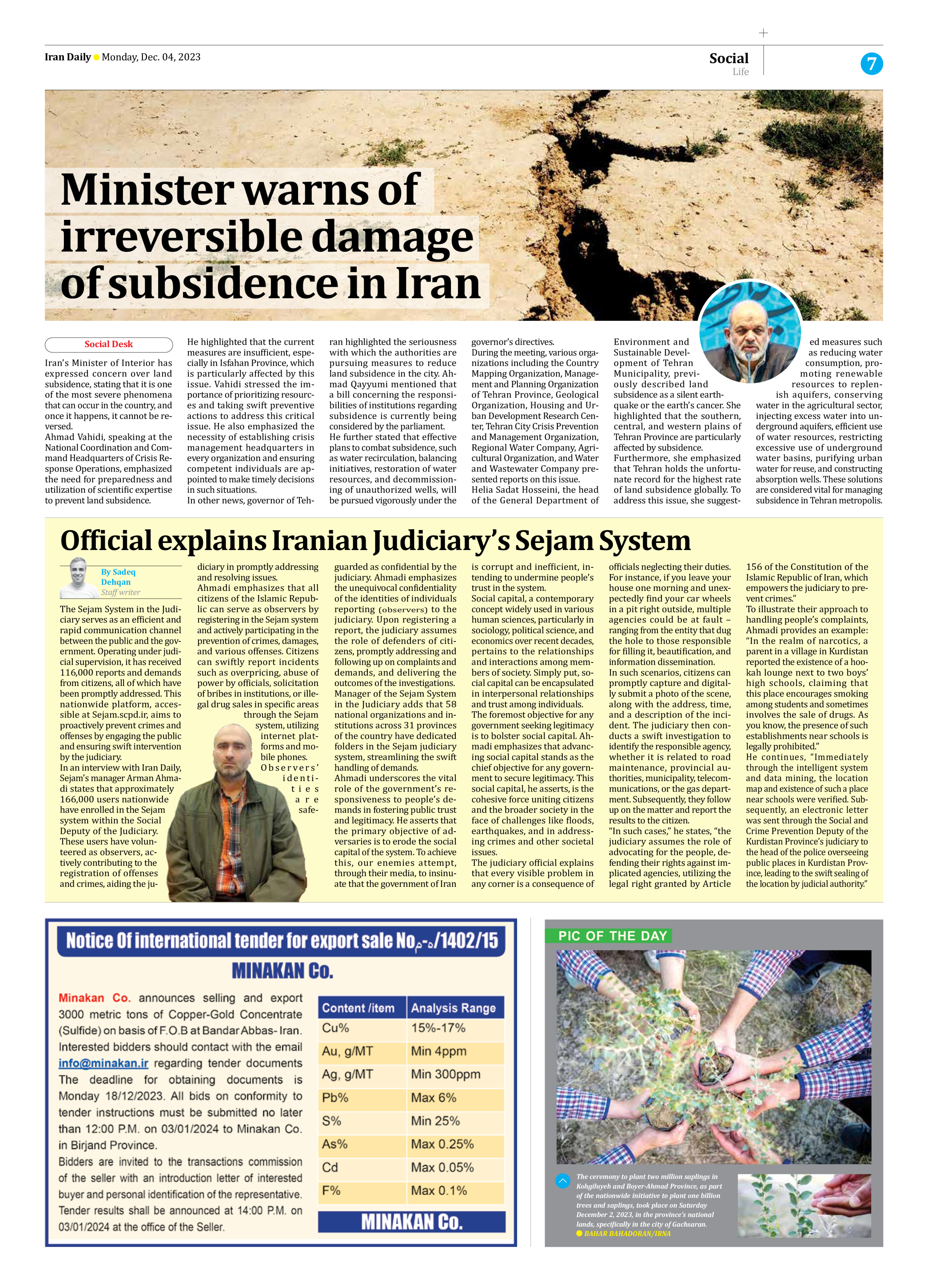
Official explains Iranian Judiciary’s Sejam System
By Sadeq Dehqan
Staff writer
The Sejam System in the Judiciary serves as an efficient and rapid communication channel between the public and the government. Operating under judicial supervision, it has received 116,000 reports and demands from citizens, all of which have been promptly addressed. This nationwide platform, accessible at Sejam.scpd.ir, aims to proactively prevent crimes and offenses by engaging the public and ensuring swift intervention by the judiciary.
In an interview with Iran Daily, Sejam’s manager Arman Ahmadi states that approximately 166,000 users nationwide have enrolled in the Sejam system within the Social Deputy of the Judiciary. These users have volunteered as observers, actively contributing to the registration of offenses and crimes, aiding the judiciary in promptly addressing and resolving issues.
Ahmadi emphasizes that all citizens of the Islamic Republic can serve as observers by registering in the Sejam system and actively participating in the prevention of crimes, damages, and various offenses. Citizens can swiftly report incidents such as overpricing, abuse of power by officials, solicitation of bribes in institutions, or illegal drug sales in specific areas through the Sejam system, utilizing internet platforms and mobile phones.
Observers’ identities are safeguarded as confidential by the judiciary. Ahmadi emphasizes the unequivocal confidentiality of the identities of individuals reporting (observers) to the judiciary. Upon registering a report, the judiciary assumes the role of defenders of citizens, promptly addressing and following up on complaints and demands, and delivering the outcomes of the investigations.
Manager of the Sejam System in the Judiciary adds that 58 national organizations and institutions across 31 provinces of the country have dedicated folders in the Sejam judiciary system, streamlining the swift handling of demands.
Ahmadi underscores the vital role of the government’s responsiveness to people’s demands in fostering public trust and legitimacy. He asserts that the primary objective of adversaries is to erode the social capital of the system. To achieve this, our enemies attempt, through their media, to insinuate that the government of Iran is corrupt and inefficient, intending to undermine people’s trust in the system.
Social capital, a contemporary concept widely used in various human sciences, particularly in sociology, political science, and economics over recent decades, pertains to the relationships and interactions among members of society. Simply put, social capital can be encapsulated in interpersonal relationships and trust among individuals.
The foremost objective for any government seeking legitimacy is to bolster social capital. Ahmadi emphasizes that advancing social capital stands as the chief objective for any government to secure legitimacy. This social capital, he asserts, is the cohesive force uniting citizens and the broader society in the face of challenges like floods, earthquakes, and in addressing crimes and other societal issues.
The judiciary official explains that every visible problem in any corner is a consequence of officials neglecting their duties. For instance, if you leave your house one morning and unexpectedly find your car wheels in a pit right outside, multiple agencies could be at fault – ranging from the entity that dug the hole to those responsible for filling it, beautification, and information dissemination.
In such scenarios, citizens can promptly capture and digitally submit a photo of the scene, along with the address, time, and a description of the incident. The judiciary then conducts a swift investigation to identify the responsible agency, whether it is related to road maintenance, provincial authorities, municipality, telecommunications, or the gas department. Subsequently, they follow up on the matter and report the results to the citizen.
“In such cases,” he states, “the judiciary assumes the role of advocating for the people, defending their rights against implicated agencies, utilizing the legal right granted by Article 156 of the Constitution of the Islamic Republic of Iran, which empowers the judiciary to prevent crimes.”
To illustrate their approach to handling people’s complaints, Ahmadi provides an example: “In the realm of narcotics, a parent in a village in Kurdistan reported the existence of a hookah lounge next to two boys’ high schools, claiming that this place encourages smoking among students and sometimes involves the sale of drugs. As you know, the presence of such establishments near schools is legally prohibited.”
He continues, “Immediately through the intelligent system and data mining, the location map and existence of such a place near schools were verified. Subsequently, an electronic letter was sent through the Social and Crime Prevention Deputy of the Kurdistan Province’s judiciary to the head of the police overseeing public places in Kurdistan Province, leading to the swift sealing of the location by judicial authority.”







